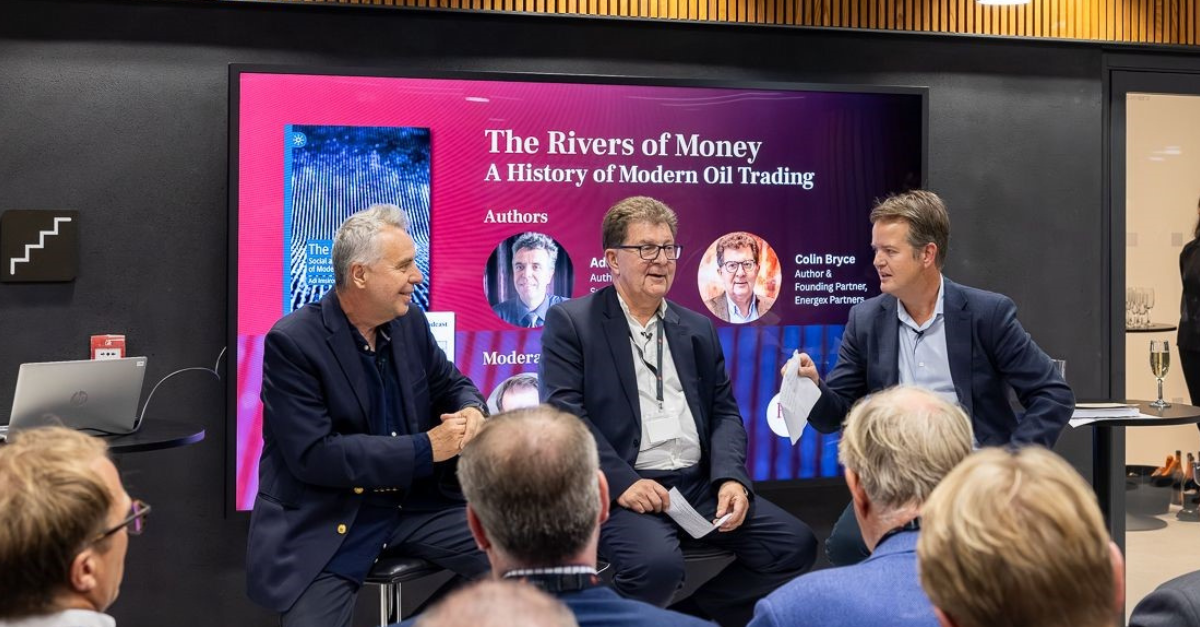On October 1st, at HC Group’s Headquarters in London, host Paul Chapman interviewed Colin Bryce and Adi Imsirovic about their new book, The Rivers of Money, in front of an invited audience of 100 friends, former colleagues and industry veterans.
Why did they write the book? What stories and insights stood out most, and who received a pickled pig’s head at their desk (it later transpired the sender was in the audience).
The authors also revealed which tales didn’t make it past the editing stage and shared their thoughts on the biggest risks and opportunities shaping the commodities industry today and in the years ahead.
You can buy 'The Rivers of Money' here. Enter this code for a 20% discount: PALAUT
To stay informed about future HC Group events, exclusive interviews, and industry insights, why not sign up for our newsletter.

Key Talent Impacts
Have Commodities Traders Evolved from Mavericks to Multidisciplinary Professionals?
Over recent decades, trader profiles have transformed. The sociable, instinct-led dealmaker of the 1980s has given way to a data-driven, digitally fluent professional. Modern traders blend commercial acumen with analytical and coding skills, operating within structured teams rather than as lone operators — a clear sign of how technology and complexity have reshaped the role.
Has Team-Based Collaboration Replaced the Individual Hero Model in Trading?
Trading has become a team endeavour, built on cross-functional collaboration between analysts, traders, and risk specialists. Organisations now recruit for collective performance, valuing those who work effectively across geographies and disciplines. The ability to share intelligence and align diverse expertise is now essential to success.
Are Emotional Intelligence and Discipline Now More Valuable than Market Intuition?
Sustained success in commodities increasingly depends on discipline, self-awareness and emotional intelligence rather than instinct or risk appetite. As markets become more data-led and regulated, resilience, adaptability and humility are now the hallmarks of effective trading talent.
Does Access to Information Create Inequality or Unlock Opportunity in Commodities Talent?
Data access remains a defining competitive advantage. Firms with advanced analytics and integrated systems attract and empower stronger talent. Developing professionals who can interpret and act on complex information and ensuring equal access to insight is now central to talent strategy.
How Are Sustainability and Regulation Redefining the Skills Needed in Energy and Commodities?
The future workforce must balance profitability with purpose. Success depends on understanding carbon markets, ESG frameworks and the energy transition. Professionals who combine commercial skill with sustainability awareness will define the next generation of industry leadership.
HC Group is a global search firm dedicated to the energy and commodities markets.
Learn more about our Liquid Fuels and Chemicals Talent Practice
Explore the full HC Commodities Podcast archive
HC Commodities Podcast Briefing
Edited highlights and themes from the podcast episode.
How has the profile of the commodities trader changed over time?
The modern commodities trader bears little resemblance to the dealmakers of the 1980s. Trading once relied on instinct, negotiation and personal networks. Today, success depends on data fluency, coding literacy and analytical precision. The maverick operator has evolved into a multidisciplinary strategist, combining commercial insight with technological skill to compete in faster, more transparent markets.
What does this shift mean for collaboration and team dynamics?
Trading has moved from an individual pursuit to a highly collaborative discipline. Teams now integrate analysts, risk managers, logisticians and data specialists. Organisations recruit for collective intelligence and cross-functional teamwork, reflecting a broader recognition that the best decisions come from shared data and diverse perspectives.
Which personal attributes matter most in today’s energy markets?
Emotional intelligence, discipline and resilience have become critical. The ability to stay composed, adapt quickly and work across cultures often outweighs raw intuition. The most successful traders combine psychological stability with analytical thinking, creating balanced, consistent performance.
How is information access influencing competitiveness?
In a market where “one dollar equals one vote”, access to real-time data and analytics determines who leads. Companies that invest in digital infrastructure and knowledge sharing create fairer, more agile teams.
What new skills will define the future of energy trading?
As regulation tightens and sustainability goals rise, the next generation of professionals must understand carbon markets, ESG frameworks and energy-transition economics. The industry’s competitiveness now depends on talent that can balance profitability with purpose.



